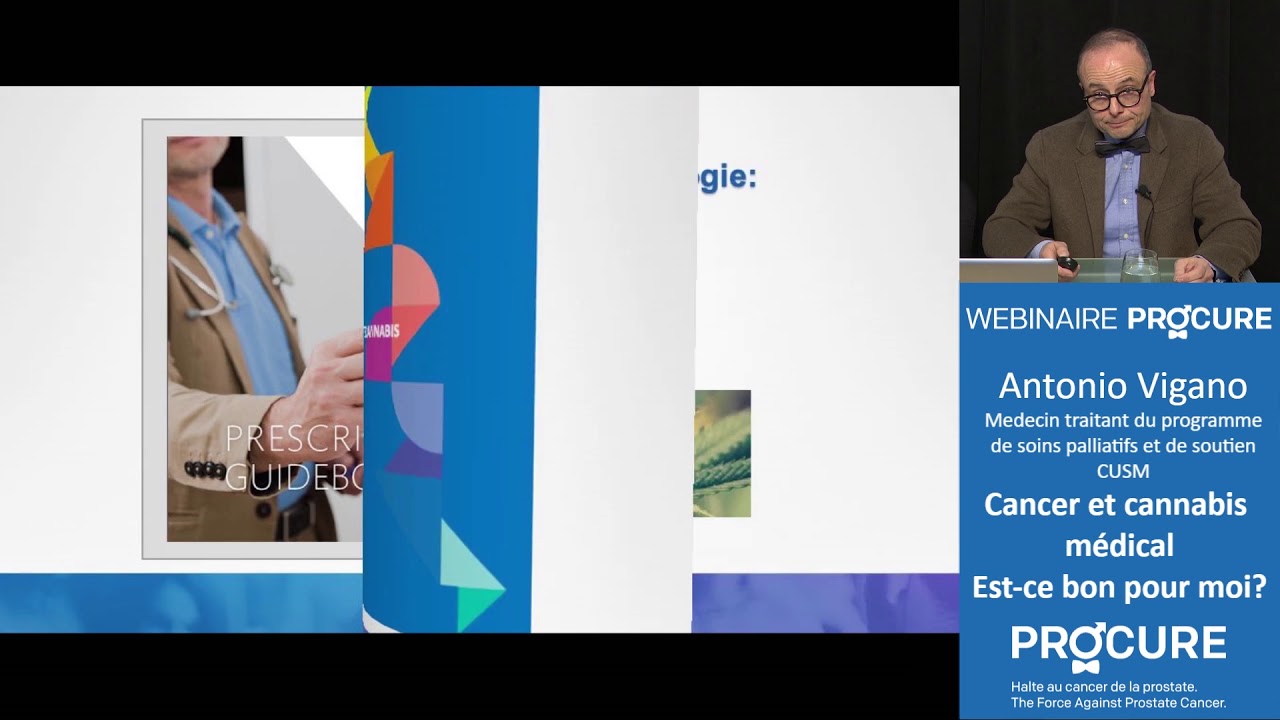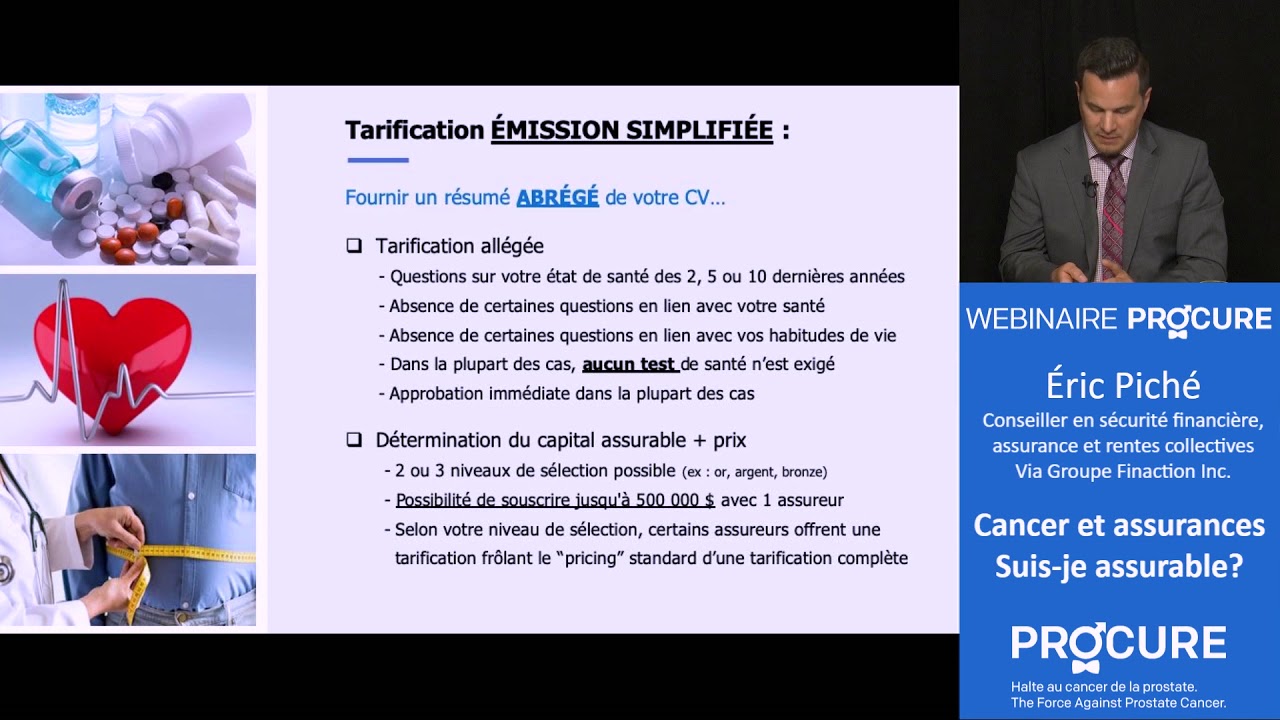Webinaires
Webinaires
WEBINAIRES
Vous informer fait partie de notre mission
Une des missions de PROCURE est d’informer la population sur le cancer de la prostate. Pour ce faire, nous organisons des webinaires visant à informer, soutenir et sensibiliser la population.
Les webinaires gratuits PROCURE EN PARLE présentés par PROCURE sont animés par des professionnels de la santé qualifiés, afin d’outiller et d’éduquer les hommes et leurs proches sur tous les sujets liés au cancer de la prostate. Les différents sujets abordés concernent le cancer de la prostate, les options de traitement, la sexualité, la nutrition, l’exercice physique, ainsi que les nouveaux traitements et la gestion des effets secondaires.
Nos experts passent en revue toutes les questions qui vous préoccupent pour un moment d’entraide et d’échange. Posez-nous toutes vos questions sur info@procure.ca, nos experts sont là pour y répondre. Tous nos webinaires sont disponibles sur notre chaîne YouTube.
Si vous avez des questions ou des préoccupations par rapport aux sujets abordés dans ces webinaires, n’hésitez pas à contacter nos professionnels de la santé spécialisés en uro-oncologie sur notre ligne de soutien sans frais 7 jours sur 7 au 1 855 899-2873.
Comment s’enregistrer
Visitez pep.procure.ca pour connaître la programmation de nos prochains webinaires et pour vous y inscrire.
Cultiver l’intimité pendant et après un cancer de la prostate
Face aux défis engendrés par les traitements du cancer de la prostate, comment les couples peuvent-ils s’adapter, reconstruire ou maintenir leur intimité? Est-il possible de favoriser l’intimité sans avoir de relations sexuelles? Guylaine Gélinas-Martel, sexologue et psychothérapeute, explore ces questions et bien d’autres dans ce PROCURE Health Talks. Ne manquez pas cette occasion d’approfondir votre compréhension et de découvrir des stratégies pour préserver l’intimité en cas de cancer de la prostate.
Vous trouverez ci-dessous tous les épisodes de PROCURE EN PARLE diffusés en 2024 et 2023. Tous nos webinaires sont aussi disponibles en tout temps sur notre chaîne YouTube.
Plus en détails
Les stratégies pour traiter le cancer avancé ont considérablement évolué, offrant de nouvelles options et de l’espoir aux patients.
Gérer une dysfonction érectile permanente après un cancer de la prostate est délicat. Découvrez des stratégies pour y faire face.
Regardez ce webinaire pour obtenir des conseils sur la façon de retrouver votre sexualité et de redéfinir l’intimité et l’image de soi après un traitement du cancer de la prostate
Le cancer de la prostate avancé englobe diverses conditions, y compris les formes métastatiques, récurrentes et résistantes aux hormones, qui soulèvent chacune des questions et des préoccupations différentes.
Les traitements du cancer de la prostate peuvent entraîner des effets secondaires, tels que la dysfonction érectile et l’incontinence urinaire, qui varient en intensité et en durée.
Vous envisagez une chirurgie radicale pour traiter votre cancer ? Regardez ce webinaire pour en savoir plus sur la procédure, ses avantages, ses inconvénients et si elle vous convient.
Après un diagnostic de cancer de la prostate, des questions sur la survie, les taux de guérison et la qualité de vie peuvent surgir.
Diagnostiqué avec un cancer de la prostate? Plusieurs options de traitement sont disponibles en fonction du stade, de l’âge et de votre état de santé
Une récidive se produit lorsque le cancer réapparaît après un traitement. La principale question est : Quelle est la suite?
L’évolution de la maladie d’un proche nécessite toujours une adaptation de la part de la personne aidée ainsi que de l’aidant. Sachez qu’il existe des ressources pour vous soutenir
Souffrez-vous d’incontinence urinaire masculine ? Vous n’êtes pas seul. Ce webinaire couvre les symptômes et les traitements pour vous aider.
Autres pages qui pourraient vous intéresser
Informations complémentaires - Cancer de la prostate

Cancer de la prostate: Tests, imagerie et biomarqueurs
Discussion about the variety of approaches available to monitor this disease before, during, or after treatment.

Cancer et gestion du stress
La kinésiologie peut-elle venir au secours de mon stress?

Cancer et cannabis
Est-ce que le cannabis médical peut aider à gérer les effets secondaires?

Vivre avec une dysfonction érectile permanente en 5 points
Vivre avec une dysfonction érectile permanente en 5 points souligne les éléments essentiels à prendre en considération face à cette réalité. Ces conseils agissent comme des repères pour vous guider, que vous soyez en couple ou que vous fassiez face à cette situation seul. Les professionnels de la santé sont là pour vous Même en […]

Sexualité et intimité en 5 points
Sexualité et intimité en 5 points aborde quelques défis spécifiques et les possibilités qui peuvent émerger à la suite d’un traitement pour un cancer de la prostate.

Votre pronostic et votre survie
Après la réception d’un diagnostic de cancer de la prostate, vous vous questionnerez certainement sur votre pronostic et votre survie et voudrez connaître les chances de succès de votre traitement.
Sources et références
Dernière révision médicale et éditoriale: janvier 2024. Voir notre comité de valiation de nos pages Web et nos collaborateurs en cliquant ici.






